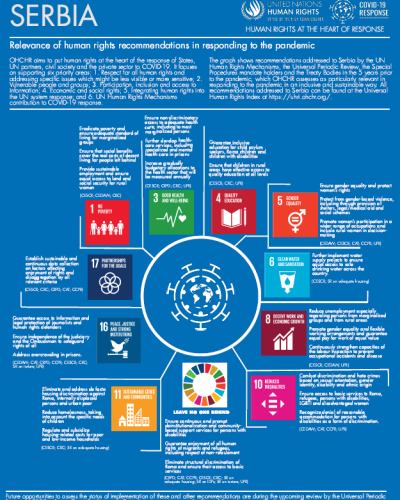SERBIA - Relevance of human rights recommendations in responding to the pandemic

During the response to COVID-19 epidemic, the United Nations in Serbia made sure that all people are ensured equal access to services, rights and assistance when in need. In particular, groups at risk of marginalization and lack of access have been in the centre of the UN’s support to response during the crisis.
One of the core commitments of the United Nations is that to human rights and freedoms, and the response to COVID-19 crisis and recovery of the country is no exception from the principle that human rights should be in the centre of every action, so that all people are equal and no one is left behind.
As a part of the rights-driven response and recovery in the context to COVID-19, a flyer has been produced, with the support from the UN Office for Human Rights (OHCHR), bringing the recommendations that the Republic of Serbia has received in the past five years from UN Human Rights Mechanisms (Treaty Bodies, Universal Periodic Review and the Special Procedures) into the COVID-19 context and linking them with the commitments under the Agenda 2030. This way, the relevant human rights recommendations are bringing support and momentum to a response and recovery that is more inclusive and aware of those most vulnerable in the country. The recommendations chosen as the most relevant address risks and gaps faced by the Roma, persons with disabilities, migrants and refugees, women and many other groups, and are to serve to Governments, the civil society and other partners in their recovery efforts, advocacy actions and policy making to alleviate the negative impact of the crisis and build back better.



